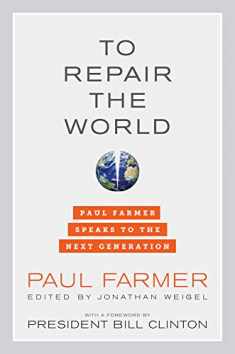
Pathologies of Power: Health, Human Rights, and the New War on the Poor
ISBN-13:
9780520235502
ISBN-10:
0520235509
Edition:
1
Author:
Paul Farmer
Publication date:
2003
Publisher:
University of California Press
Format:
Hardcover
419 pages
FREE US shipping
Book details
ISBN-13:
9780520235502
ISBN-10:
0520235509
Edition:
1
Author:
Paul Farmer
Publication date:
2003
Publisher:
University of California Press
Format:
Hardcover
419 pages
Summary
Pathologies of Power: Health, Human Rights, and the New War on the Poor (ISBN-13: 9780520235502 and ISBN-10: 0520235509), written by authors
Paul Farmer, was published by University of California Press in 2003.
With an overall rating of 3.5 stars, it's a notable title among other
Health Care Delivery
(Administration & Medicine Economics, Social Sciences, Anthropology, Behavioral Sciences, Sociology, Public Affairs & Policy, Politics & Government) books. You can easily purchase or rent Pathologies of Power: Health, Human Rights, and the New War on the Poor (Hardcover) from BooksRun,
along with many other new and used
Health Care Delivery
books
and textbooks.
And, if you're looking to sell your copy, our current buyback offer is $0.33.
Description
Pathologies of Power uses harrowing stories of lifeand deathin extreme situations to interrogate our understanding of human rights. Paul Farmer, a physician and anthropologist with twenty years of experience working in Haiti, Peru, and Russia, argues that promoting the social and economic rights of the world’s poor is the most important human rights struggle of our times. With passionate eyewitness accounts from the prisons of Russia and the beleaguered villages of Haiti and Chiapas, this book links the lived experiences of individual victims to a broader analysis of structural violence. Farmer challenges conventional thinking within human rights circles and exposes the relationships between political and economic injustice, on one hand, and the suffering and illness of the powerless, on the other.
Farmer shows that the same social forces that give rise to epidemic diseases such as HIV and tuberculosis also sculpt risk for human rights violations. He illustrates the ways that racism and gender inequality in the United States are embodied as disease and death. Yet this book is far from a hopeless inventory of abuse. Farmer’s disturbing examples are linked to a guarded optimism that new medical and social technologies will develop in tandem with a more informed sense of social justice. Otherwise, he concludes, we will be guilty of managing social inequality rather than addressing structural violence. Farmer’s urgent plea to think about human rights in the context of global public health and to consider critical issues of quality and access for the world’s poor should be of fundamental concern to a world characterized by the bizarre proximity of surfeit and suffering.
Farmer shows that the same social forces that give rise to epidemic diseases such as HIV and tuberculosis also sculpt risk for human rights violations. He illustrates the ways that racism and gender inequality in the United States are embodied as disease and death. Yet this book is far from a hopeless inventory of abuse. Farmer’s disturbing examples are linked to a guarded optimism that new medical and social technologies will develop in tandem with a more informed sense of social justice. Otherwise, he concludes, we will be guilty of managing social inequality rather than addressing structural violence. Farmer’s urgent plea to think about human rights in the context of global public health and to consider critical issues of quality and access for the world’s poor should be of fundamental concern to a world characterized by the bizarre proximity of surfeit and suffering.


We would LOVE it if you could help us and other readers by reviewing the book
Book review

Congratulations! We have received your book review.
{user}
{createdAt}
by {truncated_author}




